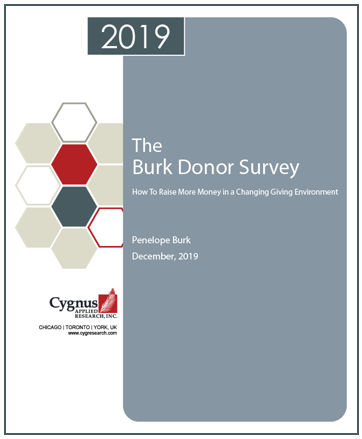In March, I conducted several seminars on the findings of our national research study, Philanthropy in a Turbulent Economy. I talked about what would motivate donors to continue giving during this recession; delegates told me what they were experiencing on the front lines. At the center of every discussion was the contribution that leadership volunteers make to fundraising.
Development Directors and CEOs noted that the recession has caused their Boards and other volunteer solicitors to become very reluctant to ask for gifts. It’s not that they’re afraid of getting a “no”; it’s that they’re convinced they’ll get, “Are you crazy?….You’re asking me to give in this economy?” Their reluctance is accelerated when it comes to donors they know personally. In good times, connection is a huge advantage; in bad times, volunteers worry about opening up embarrassing conversations with friends and colleagues who have been hurt by the recession.
Happily, our research says that these fears are unfounded. According to donors, volunteer asks could mean the difference between reaching goal and falling short.
42.5% of donors would give this year to a cause they had never supported before if asked to do so by a leadership volunteer or by someone they know personally. 78.6% of donors plan to give the same or more this year to organizations they had previously supported if they get a personal appeal from a volunteer or someone they know. And study donors who are volunteers themselves (and that includes over two thirds of all respondents) said they’d be more likely to double the value of last year’s gift if it were for an organization for which they volunteered, either now or in the past.
So, we seem to be in a fundraising catch-22. Donors can be influenced to give because volunteers make the ask; but volunteers aren’t asking for fear that donors won’t give.
Not only do people give to people, but people give to people they trust. And, volunteers are people donors can trust because they give their time and take responsibility for charities at the highest level. At a time when trust is a scarce commodity, not-for-profits’ leadership volunteers represent all that is still good and right with the world.
Editor’s note: We are very interested in learning more about how your Boards are reacting to fundraising in this economy. If this is an important issue for you, we welcome your feedback for a potential online, interactive session for leadership volunteers on this topic.
-
[…] Burk as much as confirmed this with hard data in her blog entry “A Fundraising Catch 22” http://www.cygresearch.com/burksblog/?p=205 It’s a must read for your volunteer […]
Leave a Comment



Thanks for this article. We will forward it to our volunteer campaign committee helping Dayton Children’s raise money for a new Pediatric Trauma & Emergency Center.
Just what I needed to pick up the phone and continue calling for the last $200,000. for an $8.9 Mill Capital Campaign. We have been at a standstill for just the paralizing reasons you mentioned. Thanks.
I shared your “catch-22” column with our bd of directors as we they begin to make their personal calls for our annual fund drive. They’ve definitely needed evidence that they can be successful if they just respectfully ask.
Our Board is filled with the most wonderful, incredible generous people. So far, their giving has increased 70% over last year. Thank you to all the incredible board members who make non-profits happen!
Your comments reinforce my recent experience and I will
be forwarding this to our board.
Thank you for your continued research based observations.
Our annual appeal was up 14% over the previous year. Our recent fundraiser was down about 20%. I believe for the exact reasons you mention. There was reluctance on the part of volunteers and therefore we were not able to be in front of “enough” potential ticket buyers.
Your comments arrived at a strategic time. My organization’s leadership is preparing to share our capital campaign fundraising goals with major donors. I plan to forward your message to them.
Anne
This is an especially powerful and insightful observation. I would suggest that now is a great opportunity for major gifts and especially from those who are especially close to the organization. Unfortunately, these types of gifts are consistent with the scenario you have described; often the consequence of a donors relationship with a volunteer or board member. These dedicated individuals are hesitant more now then they were before and so we are left with the catch-22 you well describe. Good read!
We’re coming up to our last two weeks of our annual appeal. This article is just what our team needs to gain confidence as they complete their follow up calls and visits. Thank you for such encouragement.
Hi! I was surfing and found your blog post… nice! I love your blog. 🙂 Cheers! Sandra. R.